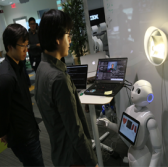 IBM’s research business and Rice University have developed a robot assistant that uses Watson-based cognitive computing application to help manage care for elderly people.
IBM’s research business and Rice University have developed a robot assistant that uses Watson-based cognitive computing application to help manage care for elderly people.
The prototype IBM Multi-Purpose Eldercare Robot Assistant is designed to measure an individual’s heart rate, heart rate variability and respiratory rate and provide answers to health-related queries as part of a study that aims to improve eldercare, IBM said Thursday.
IBM and Rice University’s departments of electrical and computer engineering and psychology worked together to created the robot assistant with Watson technologies and the university-developed CameraVitals optics technology for the measurement of vital signs.
MERA runs on the company’s cloud platform and a Softbank Pepper robot interface as well as uses the Watson speech to text, text to speech and Natural Language Classifier interfaces to interact with individuals.
IBM also launched the Aging in Place environment at the company’s ThinkLab in Austin, Texas, where the robot assistant is hosted along with internet of things and other cognitive technologies to help study the use of data from atmospheric, motion and falling, audio and olfactory sensors on healthcare.
“Our new research on ’embodied cognition,’ which can combine real-time data generated by sensors with cognitive computing, will explore how to provide clinicians and caregivers with insights that could help them make better care decisions for their patients,†said Arvind Krishna, senior vice president of IBM’s research business.
The company also plans to work with Italy-based healthcare provider Sole Cooperativa to monitor the daily activities of the Aging in Place environment’s residents with sensors.



